David Miranda and the Human-Rights Black Hole
Leah McGrath Goodman
Newsweek
January 7, 2015
D avid Miranda is many things—a boisterously proud, gay Brazilian; an outspoken civil liberties evangelist; a freshly minted university graduate; and the spouse of Glenn Greenwald, the American journalist who has been publishing highly classified material leaked by former CIA systems analyst and National Security Agency (NSA) senior adviser Edward Snowden.
But one thing Miranda is not is a terrorist. The 29-year-old has never been accused of being a terrorist. He has never been observed associating with terrorists or traveling in terrorist circles. Yet on August 18, 2013, Miranda was detained under Schedule 7 of the United Kingdom’s Terrorism Act 2000, at London Heathrow Airport, and questioned by British authorities for nearly nine hours—the legal limit. Just like a terrorist.
Miranda’s story went viral in the days that followed—a function of the high-profile work he was engaged in with Greenwald, who was writing articles for The Guardian bringing to light the Snowden files that revealed the vast reach of U.S. and British surveillance powers. More than a year later, Miranda, who was never charged with any crime, is still grinding his way through the U.K. court system to prove his detention at Heathrow was not only unlawful but a dangerous abuse of the U.K.’s surveillance and counterterrorism powers—and, by extension, those of the United States. At stake are the basic human liberties every democratic society holds sacred.
“These people did not think I was a terrorist,” says Miranda, who has experienced the U.K. only from inside one of Heathrow’s detainment rooms. “They were sending a message: ‘Don’t fuck with us.’ But you know what? We’re going to fuck with you really bad.”
In 2013, Miranda filed a lawsuit against the U.K.’s Home Office and the Metropolitan Police Service claiming he was unlawfully detained and interrogated under the Terrorism Act 2000. He also claimed that his right to freedom of expression guaranteed under Article 10 of the European Convention on Human Rights and Fundamental Freedoms (ECHR) was violated. The U.K.’s High Court of Justice rejected the suit in February 2014, and his case is due to go to appeal in the first half of 2015. In November, the details of his case figured prominently in arguments in a separate case heard before the Supreme Court (the U.K.’s highest appeals court) in London, where a panel of five justices pondered whether the scope of Britain’s counterterrorism powers impinged basic rights.
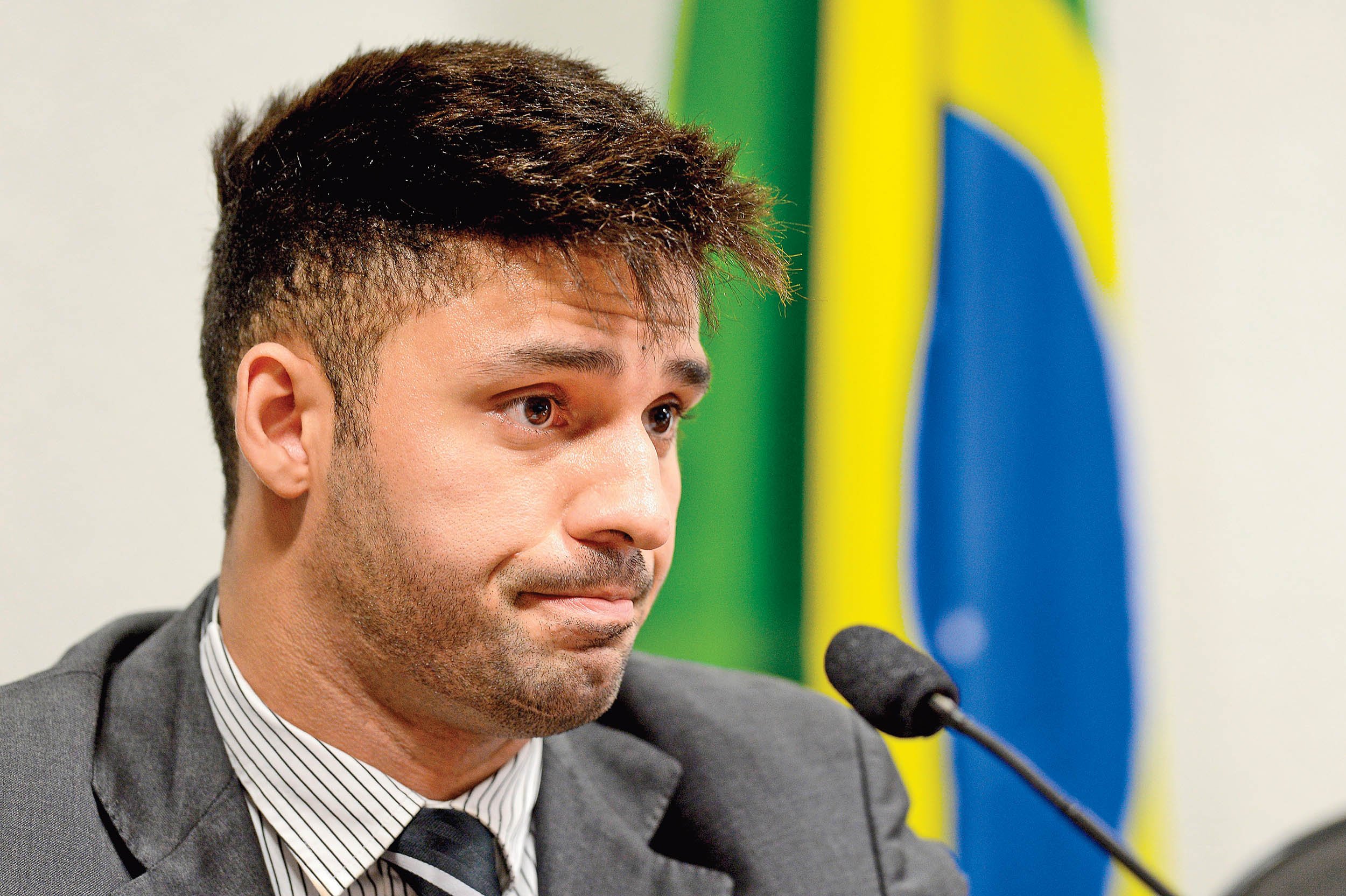
EVARISTO SA/AFP/GETTY
David Miranda, partner of the Guardian’s Brazil-based reporter Glenn Greenwald (out of frame), who was among the first to reveal Washington’s vast electronic surveillance program, speaks before the investigative committee of the Senate that examines charges of espionage by the United States in Brasilia on Oct. 9, 2013, following press reports of U.S. electronic surveillance in Brazil based on leaks from Edward Snowden, a former U.S. National Security Agency contractor.
A year ago, it seemed that most of the challenges to government counterterrorism powers had largely fallen flat, but a shift came last July with a scathing report from the U.K.’s independent reviewer of terrorism legislation, David Anderson, who suggested that, in light of the Miranda case, the U.K.’s overly broad, “and some would say alarming,” definition of terrorism was edging into dangerous territory.
Anderson, appointed by Home Secretary Theresa May in 2011 to troubleshoot the U.K.’s counterterrorism powers and recommend changes to her, the Treasury and Parliament in an annual review, is a senior barrister and describes himself as the nation’s de facto “terrorism watchdog.” His role gives him access to highly classified government documents and state secrets. While his suggestions are frequently the basis for adjustments to U.K. law and influence how police and U.K. courts exercise their powers, they are nonbinding. “The true issue is not whether the police ought to have the power to stop someone on the basis of the sort of intelligence they were given on Mr. Miranda, which they surely should and arguably do,” Anderson wrote in his report, “but whether it was lawful to use counterterrorism law for that purpose.” His recommendation: a “root-and-branch review of the whole edifice of terrorism law.”
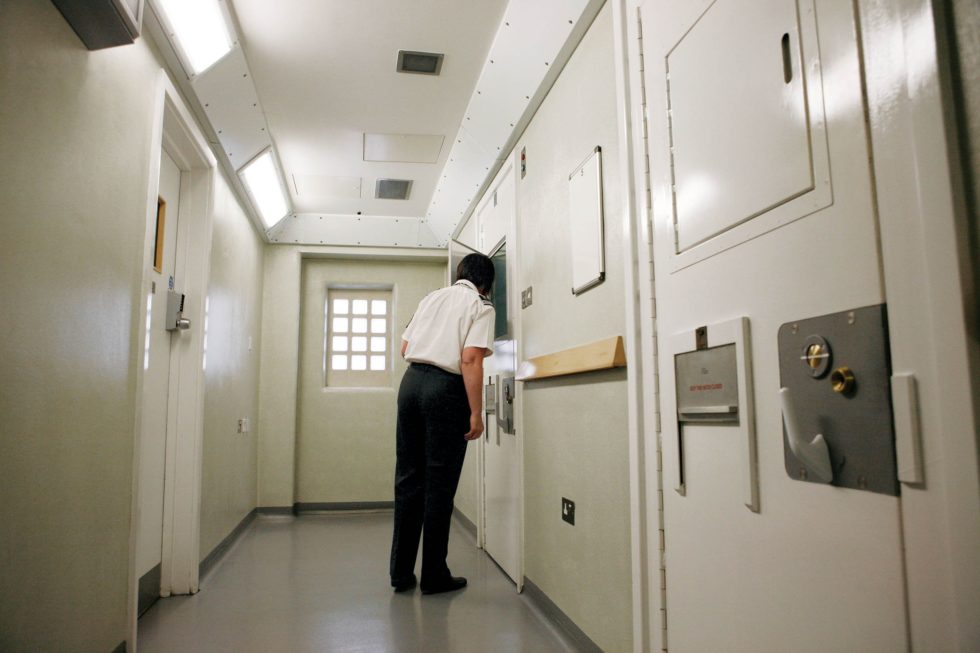
GARY CALTON/EYEVINE/REDUX
Custody Cells in the UK Border Agency at Manchester Airport.
Indeed, increasingly the consensus within the U.K.’s legal, intelligence and academic communities is that the Miranda detainment was a botched job. “To arrest David Miranda on charges of terrorism was an appalling mistake, and we still do not know who is responsible for it,” says Anthony Glees, director of the Centre for Security and Intelligence Studies at the University of Buckingham. “Even though you can see today why terrorists may have benefited from the Snowden disclosures, there is just no excuse for the fact it happened.”
The actual seizure of what amounted to stolen government property is not so contentious. Many believed the U.K. to be well within its rights, as Miranda was carrying an encrypted hard drive and two encrypted USB storage devices (along with a mobile phone, two smart watches and some video games) containing tens of thousands of secret and top-secret U.S. and U.K. intelligence documents passed on from Snowden.
Miranda was traveling to Rio de Janeiro from Berlin, where he’d just met and exchanged Snowden documents with one of Greenwald’s key collaborators, Laura Poitras, the American filmmaker who last year released the Snowden documentary Citizenfour. According to a witness statement from the U.K. deputy national security adviser for intelligence, security and resilience in the Cabinet Office, Oliver Robbins, the smuggled documents pose the risk of irreversible “damage to U.K. national security” and “a potentially catastrophic stream of public reporting of intelligence material.”
But Miranda was not just stopped and searched. “If capturing the files was the U.K.’s only goal, the main goal, he would have been detained for nine minutes and not nine hours,” says Greenwald. “I think the goal was also to send a message of intimidation.”
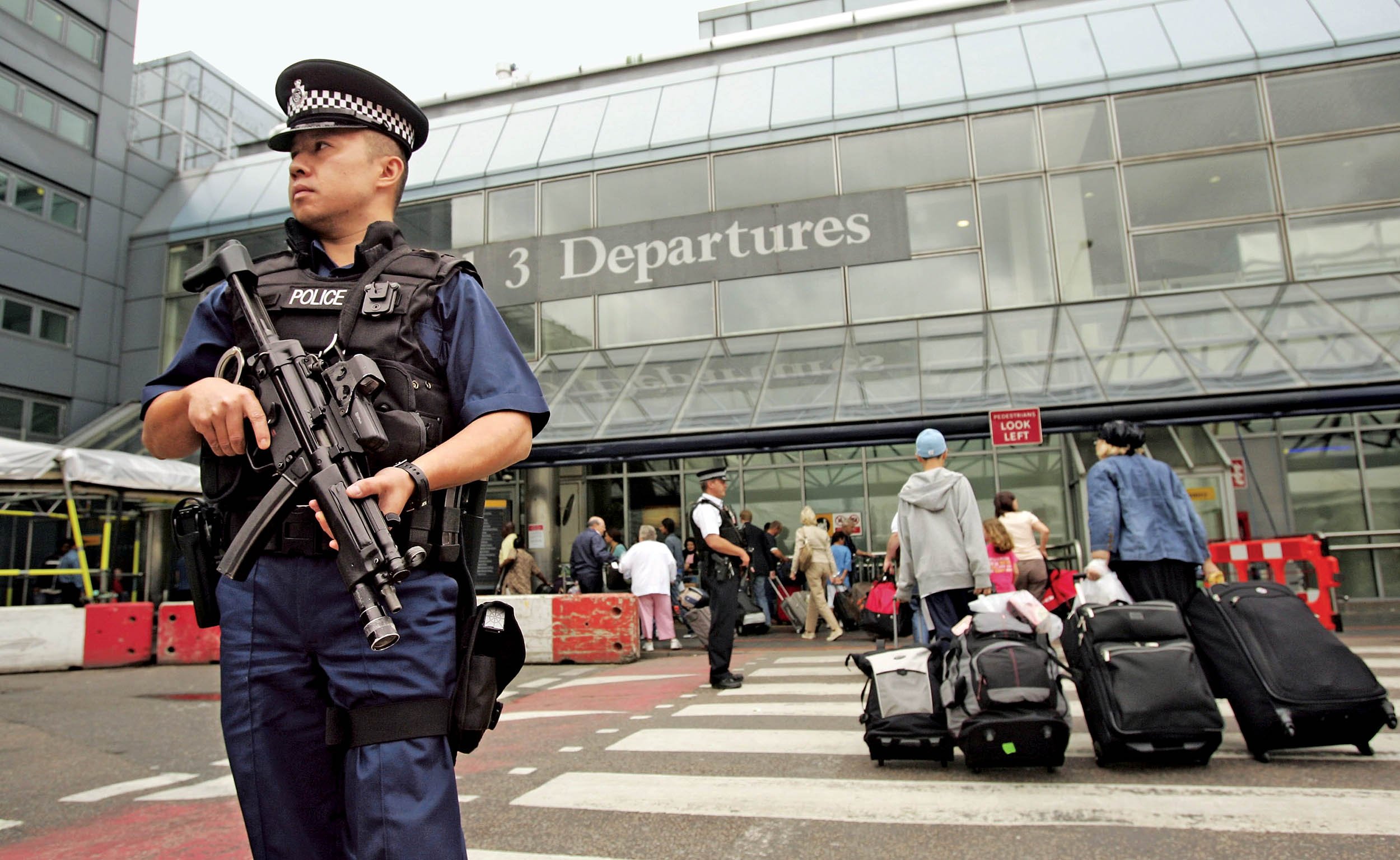
SCOTT BARBOUR/GETTY
An armed British police officer patrols outside of Heathrow Airport on Aug. 11, 2006 in London.
BLACK HOLE
Miranda’s lawyers say he stumbled into a “human-rights black hole” at Heathrow that only exists at U.K. ports, airports and international rail terminals like the Eurostar, giving U.K. authorities the right to conduct zero-suspicion search and seizures on anyone passing through them—without the need for what Americans call probable cause and what the British call reasonable grounds. (While many countries reserve the right to search noncitizens or nonresidents in border areas, including the U.S., the U.K. is unique among nations in that it executes deeply invasive and coercive searches on anyone, including its own citizens. Inside the U.K., the rules are different; no one, citizen, resident or foreigner, can be forced to undergo such examinations without grounds. This legal wrinkle applies only at U.K. border crossings.)
The power to stop and search individuals at ports and borders without suspicion first appeared in the 1989 version of the U.K.’s Prevention of Terrorism Act and was limited to just the investigation of terrorism related to Northern Ireland. It wasn’t until 2000, when the 1989 act was repealed and replaced with the current one, that broad search-and-seizure powers were introduced that could target anyone and do not require officers to establish reasonable grounds.
Since the terrorist attacks of September 11, 2001, in the United States, and July 7, 2005, in London, detentions under Schedule 7 have spiked. According to the U.K.’s statistics, it now targets more than 50,000 travelers a year passing through its ports, airports and train stations—all of whom are checked for being terrorists. Since April 2010, U.K. authorities have arrested 753 people for terrorism-related offenses and put 138 behind bars, according to the Home Office. Anyone stopped can be arrested and imprisoned and face serious charges as a terrorist.
In a speech on November 24, Home Secretary May made an appeal to the U.K. public to further expand the country’s already formidable surveillance and counterterrorism powers to combat the advancing threat of the Islamic State, also known as ISIS. As Britons learned last summer that more than 500 of their own had traveled to Syria and Iraq to fight with the terrorist group—and might return home—the U.K. Joint Terrorism Analysis Centre raised the threat level from “substantial” to “severe,” indicating a terrorist attack was highly likely on U.K. soil. Speaking at the Royal United Services Institute security think tank in Whitehall, May painted a picture of an embattled Britain where terrorists “within a few hours’ flying time of our country” are “given the space to plot attacks against us, train their men and women and devise new methods to kill indiscriminately.”
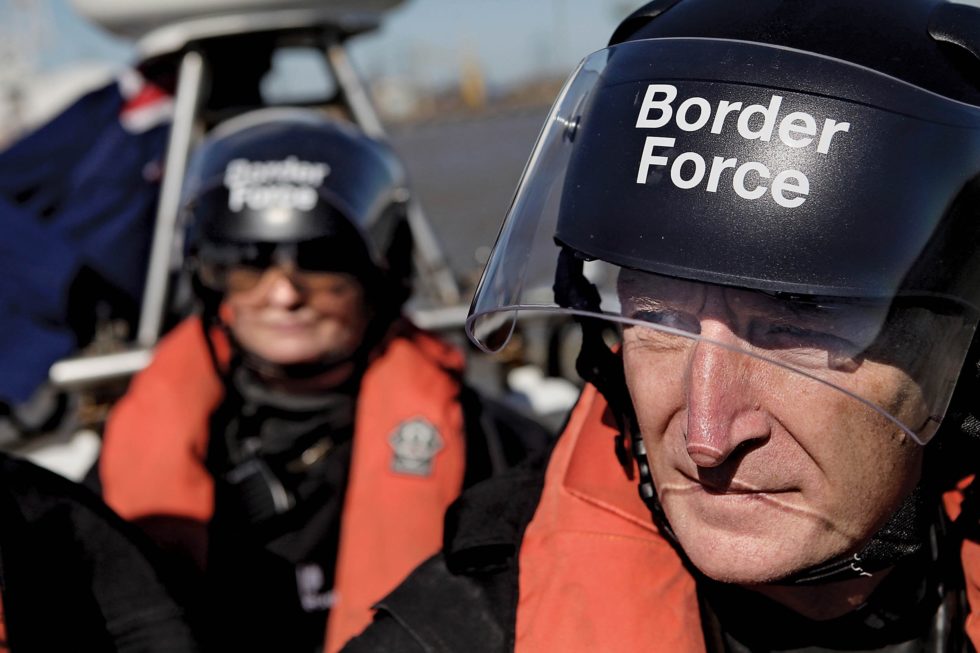
MARY TURNER/GETTY
Border Force officer Julian Woollard patrols the River Thames in a small RIB sent out from the new cutter HMC Protector, March 16, 2014 in London.
May’s speech coincided with a nationwide anti-terrorism campaign and the U.K. government’s introduction of new legislation to Parliament that seeks to broaden the country’s counterterrorism powers, granting authorities the right to seize travel documents such as tickets and passports for up to 30 days; restrict suspected terrorists’ movements both inside and outside the country; compel airlines to turn over passenger data—including credit card information—and force schools, universities, prisons and local government to muzzle “extremist” speech, enforceable by court order. May said the Home Office is working to reestablish government powers that have been “whittled down by the courts” and propounded the notion that liberties under the ECHR are “qualified and not absolute” rights. (All U.K. rights, in fact, are qualified rights, except for the right to not be tortured.)
GOING FISHIN’
Miranda’s case—seen by the U.K.’s legal community as the strongest yet to threaten the counterterrorism powers of the U.K. government—is a test of how the government balances its job of “protecting” the public with the duty to protect individual liberties and the right to privacy. As May pointed out in her speech, under her purview the U.K. has “changed the law to make clear to the courts” that the right to a private life and family life, which includes private correspondence—Article 8 under the ECHR—is no longer an inalienable right.
The U.K. Supreme Court case heard in November, which is shaping up to be a second test case, involves Sylvie Beghal, a 45-year-old French national and U.K. resident who got fed up after being detained three times in 14 months at British airports and sued the U.K. government. The final time, in 2011, she was returning on a flight from Paris with her three children—one of them still breast-feeding—and was slapped with a criminal charge for refusing to answer questions without a lawyer. She pleaded guilty to doing this but is seeking to have the conviction overturned based on her treatment. (Her lawyer arrived within 40 minutes of her calling him, but the police decided to charge her as he arrived and refused to proceed with interrogating her in his presence.)
Miranda, who was not charged while under detainment, was also initially denied a lawyer. U.K. law stipulates detainees are entitled to a lawyer of their choosing, but in practice this often doesn’t happen.

NTI/EPA
Video grab of Djamal Beghal at home with his children in 2001. Beghal, 39, a French National has been jailed for 10 years in France for leading a plot to blow up the U.S. Embassy in Paris, March 15, 2005.
Miranda and Beghal have little in common. Beghal is a Muslim whose spouse, Djemal Beghal, is in prison in France on terrorism charges, which he denies and says were based on information extracted under torture. Miranda was carrying files from Snowden to Rio, where he lives with Greenwald, who intended to use them for journalistic purposes. Both, however, are challenging the U.K.’s authority to strip travelers of their rights at the border—in particular, those acknowledged by the ECHR as well as British common law, such as the right to liberty and security of person; the right to privacy and private correspondence; the right to not self-incriminate; and the right to a family life, freedom of movement and freedom of expression.
Miranda and Beghal were both told they were not suspected of being terrorists, even though they were detained under Schedule 7 of the Terrorism Act—legislation designed to catch terrorists. Schedule 7 allows examining officers to detain anyone for hours, and force travelers to answer private and deeply invasive questions about their personal lives, friends, family, finances and religious beliefs. By law, all questions must be answered; there is no right to not self-incriminate. Travelers must remove articles of clothing if asked and must give up private data such as passwords to mobile phones and laptops so police can copy and keep personal files and private data, such as photos, indefinitely. Any failure to comply can result in longer detainments, imprisonment, criminal charges—or all three.
In his arguments in November, Matthew Ryder, the lawyer at London’s Matrix Chambers representing both Beghal and Miranda, highlighted that the law does not sufficiently constrain border officers from conducting a “freewheeling check” versus a “focused task.” He suggested that once travelers are detained under Schedule 7 of the Terrorism Act, despite being under no suspicion of terrorism, they are effectively “stripped naked of their rights” and unable to legally defend themselves. “There’s nothing in reality that prevents a fishing expedition under this code,” he told the five justices. In fact, he argued, because national security is held above all other rights, those detained have found it “virtually impossible” to gain any legal relief when they bring their complaints to U.K. courts.
For ordinary citizens and travelers, the law leaves them “unclear as to whether or not their actions are liable to be treated as criminal,” Anderson said in his report last July, noting that in 2013 the Supreme Court recognized that this “risks undermining the rule of law.”
In the witness statement submitted to the High Court in the Miranda case by Robbins, he defended the government’s sprawling counterterrorism powers as necessary for protecting national security. “Over and above the statutory duties of the security and intelligence agencies, one of the first functions of government is to protect the country and its citizens against threats,” he said. “It is this overriding interest which informed the approach of [Her Majesty’s Government].”
Given the heavy collaboration going on between U.K. and U.S. intelligence agencies, Ryder raised concerns during the Beghal case that the existing legal framework, which he describes as woefully lacking in safeguards, creates the wrong incentives for intelligence agents and border officials to abuse and exploit the human-rights black holes at U.K. ports, airports and train stations for “secondary” or even politically motivated purposes. “Who you select is not in any meaningful way spelled out in the code,” he told the U.K. Supreme Court, adding that once persons are seized, they can find themselves subject to a “full police interrogation, sans lawyer” and, like Beghal, even convicted for defending their rights to basic protections.
The U.K. Treasury Solicitor’s Department, which arranges for the defense of government agencies in U.K. courts when they are challenged, dispatched its top counselor, James Eadie from London’s Blackstone Chambers, to argue against Ryder in November. Eadie argued that safeguards are not needed for a “no-suspicion” stop-and-seizure power. Officers are constrained enough, he said, by the requirement that they must act in good faith and not conduct arbitrary searches. He also defended the powers as essential for the protection of the public from “threats of the most serious kind.” Ryder, in response, stated: “Utility is not an answer to a discretionary power that violates the law.” Ryder and Eadie, as well as the treasury solicitor’s office, declined to comment, pending judgment.
“We may not hear a judgment on Beghal for a few months,” says Kate Goold, a partner at U.K. law firm Bindmans, who has worked on the Miranda case. “But if they win, we win.”
Even if Beghal wins, the one additional right Miranda may continue to litigate that is not at issue in the Beghal case, she says, is freedom of expression. Crucially, the ECHR guarantees the right “to hold opinions and to receive and impart information and ideas without interference by public authority and regardless of frontiers.”
In an interview in December with Newsweek, Greenwald said the colossus of U.S.-U.K. counterterrorism powers has experienced mission creep since the September 11 attacks. “Our information is that these powers now go well beyond the scope of terrorist surveillance—they are monitoring economic conferences, climate change conferences, our allies, our enemies, even corporations,” he said.
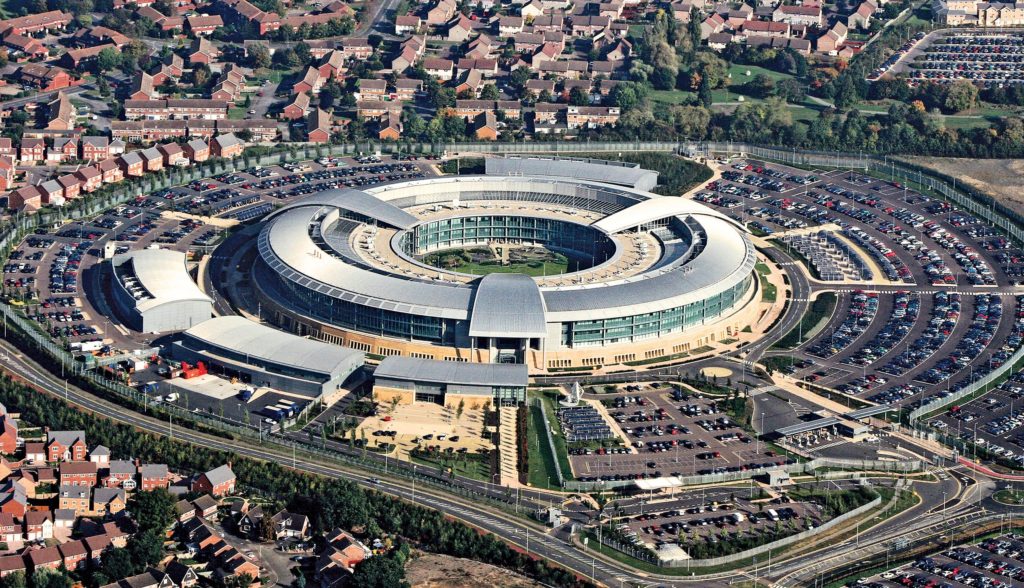
DAVID GODDARD/GETTY
Amidst the houses and the car parks sits GCHQ, the Government Communications Headquarters, in this aerial photo taken on Oct. 10, 2005.
On Christmas Eve, the United States’ NSA, which works closely with the U.K.’s Government Communications Headquarters (GCHQ) to monitor global communications for intelligence gathering, released a report admitting to more than a decade of unlawful privacy violations, from 2001 to 2013, including instances where intelligence officers were found spying on their partners or spouses.
YOU NEED A BIG HAYSTACK
It was these same far-reaching counterterrorism and surveillance powers that allowed the U.K. authorities to track and intercept Miranda and his stash of classified Snowden documents—an operation that went forward with the full knowledge of Home Secretary May, U.K. Prime Minister David Cameron and the White House.
Surveillance remains one of the most controversial of the U.K. and U.S. governments’ counterterrorism powers—and the two countries go to great lengths to hide the extent to which they collectively scrub global communications and commingle their data. While the U.S. has acknowledged the existence of PRISM, the mass surveillance data-mining program run by the NSA, a similar program run by Britain’s GCHQ, Tempora, has yet to be acknowledged by the Home Office. Tempora captures communications in bulk from trans-Atlantic fiber-optic cables—an estimated 40 billion items a day—then uses computer processing power to rapidly sift through the material, which is narrowed to “needles from a haystack,” according to Sir David Omand, who headed up GCHQ from 1996 to 1997. (He later became permanent secretary in the Home Office and security and intelligence coordinator in the Cabinet Office through the September 11 attacks to his retirement in 2005.) From there, GCHQ and NSA analysts are able to examine the data, which, by U.K. law, may focus on preexisting persons of interest—or, more controversially, form the basis for new suspicions.
While the U.K. intelligence operation is just a fraction of the size of the U.S. intelligence empire, Greenwald says the “intelligence apparatuses of the U.S. and U.K. are nearly indivisible,” with the U.S. paying “hundreds of millions of dollars a year” to receive information from the U.K. “Under the law, the U.K. has fewer limits and can do things the U.S. can’t,” Greenwald says. “The U.S. benefits from that.”
Omand has joked of the U.S.-U.K. relationship, “We have the brains. They have the money. It’s a collaboration that’s worked very well.” But he takes issue with the “mass surveillance” characterization.
“The category error journalists have made is conflating bulk access with mass surveillance,” he says. “In the needles of the Internet, you need a big haystack. No human being has access to the whole haystack, and they cannot, because there is just too much data. You might have computers looking for the IP address of a particular machine known to be in use by a terrorist. The art is to whittle it down. The rest we are not authorized to look at and don’t look at.”
But what happens when a non-terrorist is flagged? What if intelligence agents at GCHQ or the NSA make a mistake? Are there safeguards in place for people to defend themselves before being branded suspected terrorists?

TIM GRAHAM/GETTY
Satellite antenna dish are seen at GCHQ Bude Satellite Listening Station defense at Cleave Camp, Cornwall, United Kingdom.
OFFICIAL SECRETS
In Miranda’s case, even the High Court, which was privy to classified evidence, struggled to assess how decisions were made about detaining him. “The examining officers are not told and do not know anything about the intelligence behind the stop,” wrote Lord Justice Laws in the Miranda decision in February. “How then should the court approach ascertainment of the purpose for which the stop was executed under Schedule 7?” he asked.
Britain’s Security Service, or Mi5, first became aware of Miranda’s movements days before he arrived at Heathrow in August 2013. Just a few days into his trip to Berlin, on the morning of August 15, MI5 briefed the Metropolitan Police Service’s Detective Superintendent Jim Stokley about detaining Miranda, according to evidence presented to the High Court.
The next day, MI5 sent a form, called a port circulation sheet (PCS), requesting that Miranda be detained under Schedule 7 when he arrived at Heathrow that weekend. What is interesting is MI5’s response on page 2 of the form, which asked for it to confirm that the person to be detained “appears to be someone who is or has been concerned in the commission, preparation or instigation of acts of terrorism.” This was crucial to lawfully stopping him under Schedule 7. MI5 entered the words: “Not applicable.” According to the High Court, “This first PCS was not actively considered when it was received.”
Midday the next day, August 17, MI5 sent a second form, again asking for the search and seizure of Miranda. Once more, the police department did not think the information on the form was sufficient to justify a lawful stop. Miranda was due to arrive just after 8 a.m. on August 18. What happened next could only be described as a scramble by MI5. The Security Service sent another note on Friday to Detective Superintendent Stokley, citing a “national security” justification for stopping Miranda. But it still stopped short of calling him a terrorist. That tack changed by the evening of August 17, when MI5 sent a final PCS form, this time closely tracking Britain’s legal definition of terrorist—a person who uses threat to endanger lives, influence the government or advance a political, religious, racial or ideological cause.
“We assess that Miranda is knowingly carrying material, the release of which would endanger people’s lives,” MI5 wrote on the form. “Additionally, the disclosure or threat of disclosure is designed to influence a government and is made for the purpose of promoting a political or ideological cause. This therefore falls within the definition of terrorism and, as such, we request that the subject is examined under Schedule 7.”
Stokley, who handled the preponderance of the correspondence with MI5, never saw the final PCS form and told the High Court, “It is not my role to approve them.” The officer who gave final approval, Detective Inspector Woodford (neither the High Court nor the Metropolitan Police Service would disclose his first name), did not know what “material” Miranda was suspected of carrying and did not see the final form until minutes before Miranda arrived at Heathrow. Through the Metropolitan Police Service, both Stokley and Woodford declined to comment to Newsweek.
In his July report, Anderson, who viewed the confidential correspondences between MI5 and the Metropolitan Police Service, noted the terms of the request “certainly had the flavor of espionage, rather than terrorism.” He added that when “the police correctly responded that the request from MI5 did not give sufficient assurance that there was a lawful basis for the use of Schedule 7,” MI5 quickly “reformulated its request in a manner that consciously tracked the statutory definition of terrorism.” The extension of the definition of terrorism to apply to journalism, he said, was a first for the U.K.
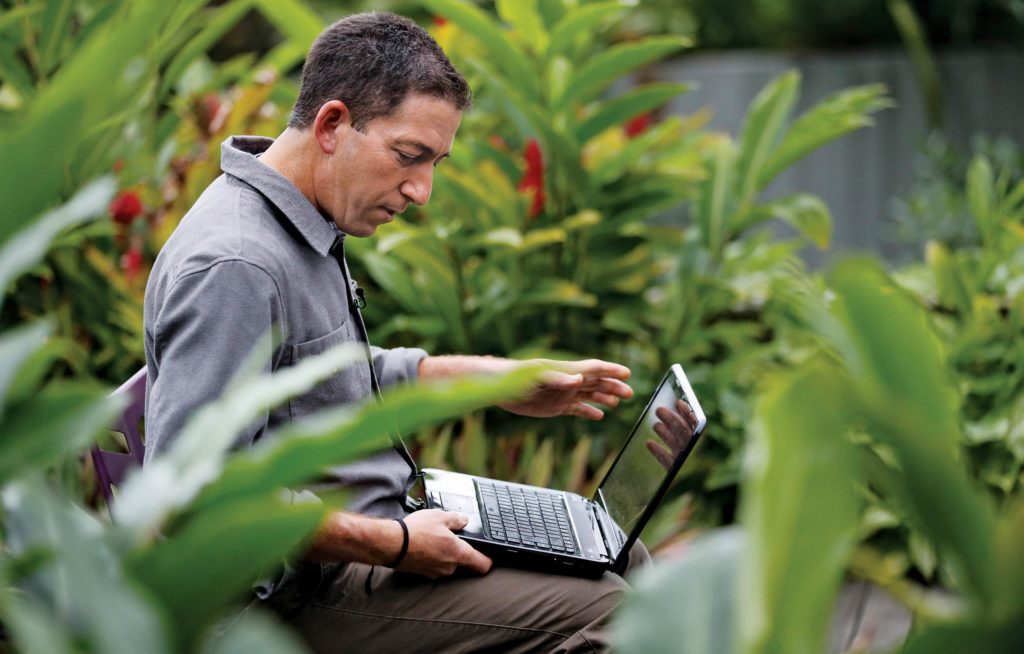
SERGIO MORAES/REUTERS
Glenn Greenwald, the blogger and journalist who broke the U.S. National Security Agency (NSA) surveillance scandal, uses his laptop before an exclusive interview with Reuters in Rio de Janeiro July 9, 2013.
The details of Miranda’s detainment are now well known—he was met coming off his flight at 8:05 a.m. by Woodford and questioned for nine hours by seven examining officers, none of whom were identified by name, only serial numbers. His encrypted hard drive and USB sticks were taken and his electronic files copied, including personal photos on his phone, the kind you and your partner don’t want anyone else to see. Miranda was not allowed to call Greenwald, and the examining officers initially denied him a lawyer of his choosing, insisting he speak with one of their lawyers. Later in his detainment, he says he was allowed access to a lawyer from The Guardian, but their right to speak privately was heavily restricted.
Above all, Miranda felt the exercise was made to be as intimidating as possible.
Glees points out that other U.K. laws, such as the Official Secrets Act, would have been much more fitting for the purpose of apprehending Miranda and his cache of state secrets. “It would have been an incontrovertible case, because Miranda was clearly in possession of our country’s secrets, not to aid jihadists but to reveal the secrets of the British state,” he says.
Omand agrees, although he believes the options would have been more punishing for Miranda. “There is some question as to whether it would have been better to stop Miranda under the Official Secrets Act. But that surely would have meant him spending the night in prison and being charged.” At present, a criminal investigation of Miranda is underway, but no charges have been brought.
What most likely happened, Glees says, is that the U.K. was worried about the political fallout of detaining Miranda under the Secrets Act. “The British people don’t like secrets and don’t want to hear about material being kept on them, but they don’t often object to someone detained as a terrorist,” he says.
Anderson, who, as an independent reviewer, would not explicitly weigh in on whether Miranda should have been held under the Terrorism Act, also raised concerns about the violation of public trust: “To render people subject to the terrorism laws whom no sensible person would think of as terrorists risks destroying the public trust upon which these special powers depend for their acceptance by the public.”
Aside from confirming she was given advance notice of Miranda’s detainment, Home Secretary May, who is directly accountable to Parliament for the actions of MI5 and GCHQ, referred all inquiries to the Metropolitan Police Service—which is declining comment, pending the outcome of Miranda’s legal challenge. Both the White House and 10 Downing Street have distanced themselves from the decision-making process leading up to Miranda’s detainment.
CRACKING THE CODE
For all the scrutiny over Miranda’s detention, intelligence services still do not know exactly what he was carrying. U.K. intelligence officials, including those at MI5, the Secret Intelligence Service, GCHQ and its National Technical Assistance Centre, have been working around the clock to discover exactly what was inside those heavily encrypted files. “This is not a simple process, and, even given the very high priority that is being placed on the work, which is, of course, diverting resources within the security and intelligence agencies, this will take a considerable amount of time and will consume a large amount of resources,” Robbins said in the witness statement he submitted to the High Court in the Miranda case. On the hard drive alone, he estimated Miranda was carrying 58,000 highly classified intelligence documents, which “we assess might be a complete set of the U.K. intelligence documents held on one particular network.” Of the U.S. intelligence data Miranda might have been carrying, Robbins said: “We believe that it is likely some or all of [the] U.S. material is contained in the data held on the USB sticks.” Miranda told Newsweek the memory sticks contain almost exclusively raw, classified data provided by Snowden.
“It was a bit of a stretch, detaining Miranda under the Terrorism Act, given that Security Services hasn’t been able to say exactly what he was carrying,” says Omand.
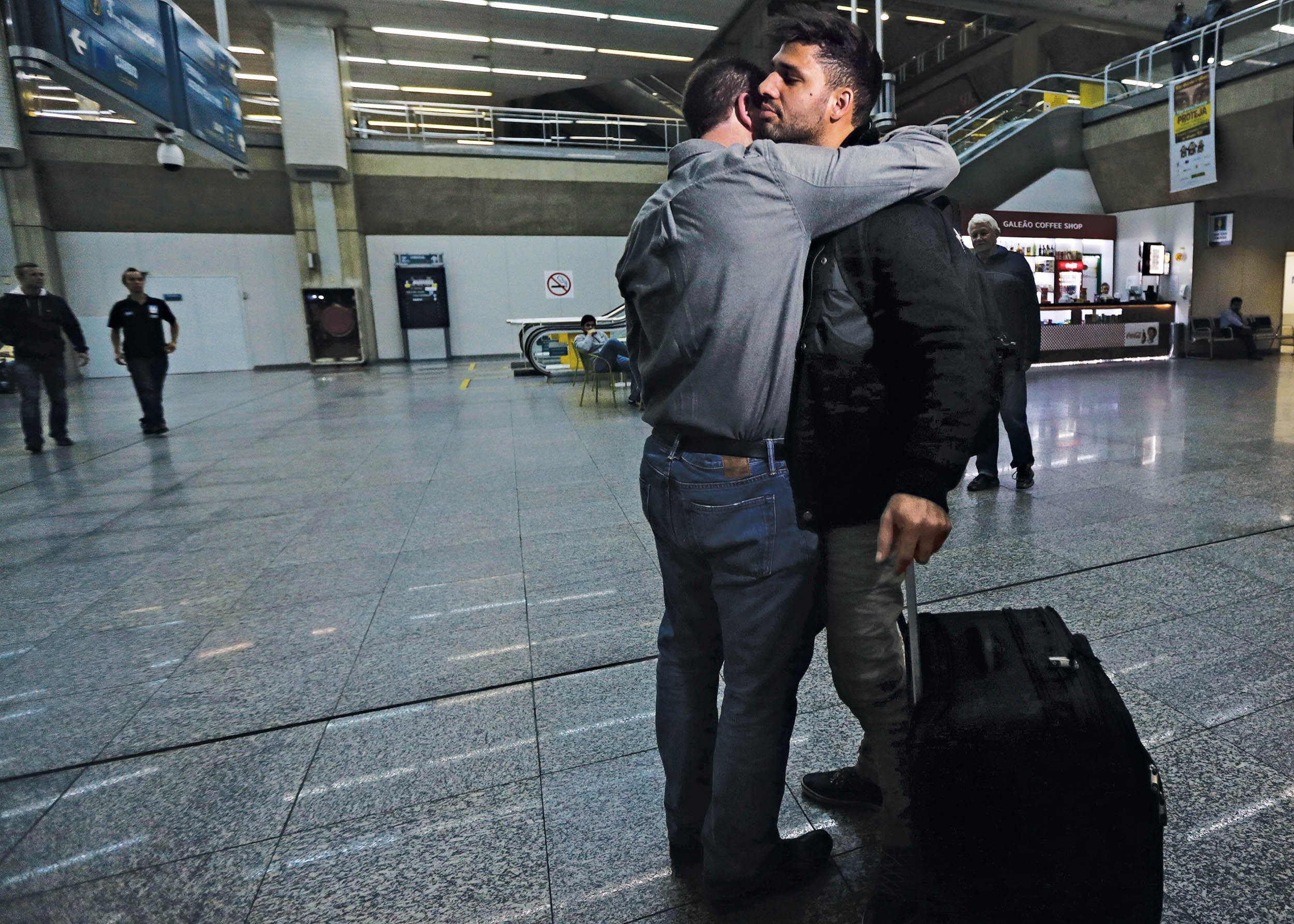
RICARDO MORAES/REUTERS
U.S. journalist Glenn Greenwald (L) embraces his partner David Miranda upon his arrival at Rio de Janeiro’s International Airport, Aug. 19, 2013. British authorities used anti-terrorism powers on Sunday to detain Miranda, the partner of Greenwald, who has close links to Edward Snowden, the former U.S. spy agency contractor who has been granted asylum by Russia, as he passed through London’s Heathrow airport. The 28-year-old Miranda, a Brazilian citizen and partner of Greenwald who writes for Britain’s Guardian newspaper, was questioned for nine hours before being released without charge, a report on the Guardian website said.
At the time of his detainment, Miranda did not have password access to the highly classified files seized by U.K. border police. But, on a handwritten piece of paper, he was carrying the password to an index, a single file on the hard drive describing some of the Snowden files, which is the basis for Robbins’s guess as to what he might have been carrying. Greenwald tells Newsweek the full files reveal the far-reaching magnitude of the top-secret surveillance programs being conducted by the U.S. and U.K. governments to allow them to snoop on their own citizens, as well as people around the world. “They did not want this material to come to light,” says Greenwald, who has access to copies of the files. “We have a memo where the U.K. government openly states that it would cause embarrassment, unwanted debate and possible lawsuits over the invasion of privacy.”
The conflict, at times, has assumed surreal proportions. In 2013, just days after Miranda’s detainment, British intelligence officers stood in the offices of The Guardian to witness the destruction of the newspaper’s hard drives containing some of the Snowden files. That, like Miranda’s detention, turned out to be fruitless, as backup copies of the Snowden files had been disseminated elsewhere.
JOURNALISM AS TERRORISM
In a witness statement submitted to the High Court, Greenwald decried the U.K.’s attempt to interfere with reporting of the Snowden files: “Our reports have triggered a worldwide debate about the value of Internet freedom and individual privacy and about the dangers of allowing the U.S. and U.K. to construct a massive system of suspicionless surveillance with no transparency or accountability,” he stated.
Anderson wrote at length in his July report about the dangers of stretching the definition of terrorist in the Terrorism Act, which includes those who use “threat” to advance an “ideological” cause that might “influence the government,” to encompass journalists. “To bring activities such as journalism and blogging within the ambit of ‘terrorism,’ even if only when they are practiced irresponsibly, encourages the chilling effect that can deter even legitimate enquiry and expression in related fields,” he said.
The freedom of expression rights at the heart of Miranda’s case—encompassed in Article 10 of the ECHR—touch on everything from newspaper articles to personal emails, and it boils down to this: If the government may be watching you or might punish you for what you say, will that affect how you express yourself?
Omand, who is not afraid to talk about the dampening prospect of “over-surveillance,” says the goal of national security is to reduce the risk of threat to the public, but not necessarily to eliminate it, with minimal impact on the day-to-day lives of citizens. “Every time people say, ‘We need more powers,’ the test is, ‘How much before this disrupts normal life?’ Our goal is for people to continue to go about their normal lives, freely and with confidence—that means basic liberties and freedoms, transportation, stable markets. If normal life can continue, then we’re winning and they’re losing. The goal is not to disrupt public life; once we do that, they’re winning.”
Anderson raises concerns of an Orwellian “chilling effect” on newspapers and publications under a post-Miranda regime, stating that under the U.K.’s statutory definition of terrorism, the act of “publication may be a terrorist action, regardless of whether the material published was stolen, or classified,” and “the consequences of publication as a terrorist action stretch well beyond the national security sphere.”
Taken to the fullest extent of current law, Anderson says, a journalism organization could be deemed to be a “terrorist organization,” making it “a criminal offense to be employed by it or to fund it.” An affiliated person could face up to seven years’ imprisonment for simply supporting the publication of articles or circulating them, and 10 to 15 years in prison for possessing documents helpful to the writing of such articles.
“Both the newspaper and its journalists could be designated under asset-freezing legislation, rendering it a criminal offense to make funds, financial services or economic resources available to them without a license, if the Treasury deemed this necessary to protect the public from similar ‘terrorist’ activities,” he says. The movements of journalists or those assisting them could even be restricted by laws—as is already the case for terrorists placed under what have become highly controversial U.K.-imposed quarantines.
In the final analysis, “terrorism,” he says, could be nothing more than an article or blog arguing against the vaccination of children for certain diseases. If judged to create a serious risk to public health and designed to influence government policy—something journalism frequently does—it “would be classed by the law as a terrorist action.”
The law would apply whether the holder or publisher of material deemed hazardous realizes it is dangerous or not, Anderson concludes, raising the possibility of what Beghal and Miranda’s lawyer Ryder calls the “accidental terrorist.”
“The significance of Miranda is to demonstrate that the publication of facts and opinions may itself be an act of terrorism on no other basis than that it is politically motivated and is considered to endanger life or create a serious risk to public health or safety,” Anderson says. He adds, “It is important that the definition remains wide enough to cover the evolving threat, but a definition so wide as to catch activity falling well outside the ordinary understanding of terrorism jeopardizes the public acceptance of the need for anti-terrorism laws.”
BECOMING THE STORY
The significance and delicacy of being an objective journalist covering a story and then suddenly becoming an unwilling, if integral, part of that story is not lost on Greenwald and Miranda. This, more than anything else, is how a journalist makes the transition to what Greenwald calls “adversarial journalism.”
Greenwald and Miranda have been swamped by the very same counterterrorism and surveillance forces they have sought to expose. Says Miranda, “We have cameras all over the house, our phones are encrypted, our computers are encrypted. You can never be 100 percent safe, but since they detained me I think we are more protected now than ever before, because it was such a stupid move.”
Miranda says he is still recovering from the trauma of being held for nine hours and having no idea what was going to happen to him. “I lost weight, at least five kilos. I went back to the gym and gained it back, but then I went back to smoking,” he says. “I quit, but actually, I have a cigarette in my hand right now.”
Miranda says he still can’t shake the eerie feeling of the moment when he flew back to Brazil after his detainment and logged on to his Skype account, only to see he was already logged in from the other side of the world—his identity hijacked by nameless intelligence agents burrowing through his accounts.
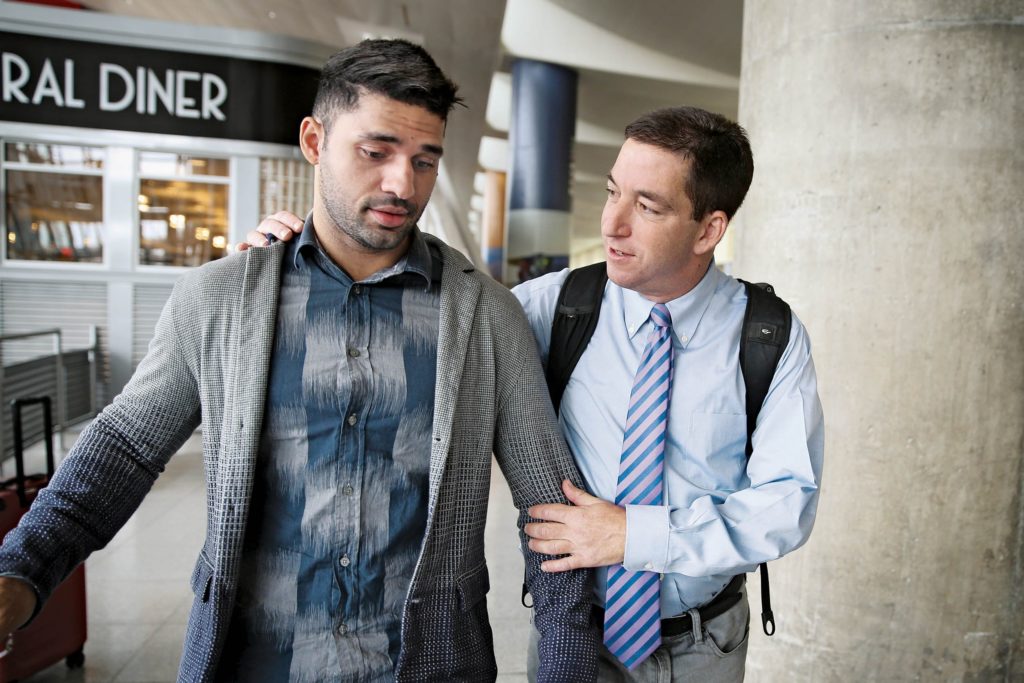
JOHN MINCHILLO/AP
Glenn Greenwald holds his partner David Michael Miranda, left, after arriving at John F. Kennedy International Airport on April 11, 2014 in New York. Greenwald and Laura Poitras of the Guardian share a George Polk Award for national security reporting with The Guardian’s Ewen MacAskill and Barton Gellman, who has led The Washington Post’s reporting on the NSA documents.
After interviews with Miranda and Greenwald over the course of a few months, it is easy to see how they became partners. Miranda, who is headstrong, appears nonplussed about being called Greenwald’s “human passenger pigeon” (a term coined by the press and repeated by Robbins in his witness statement about Miranda’s detainment). To the contrary, he says, he feels privileged to be working on the Snowden files with Greenwald. “I was here when he had only 100 people on his blog. His first post, his first book, I was there. He’s jumping and I’m not going to jump with him? We are together. This has only made our relationship stronger. There have been down points, like at Heathrow. But it’s been a big adventure. It’s been exciting to see people devoting their lives to transforming the world.”
Glees believes the Miranda case could be a turning point. “Our intelligence community has begun to see that too much secrecy had become counterproductive, especially as it leads to people believing in things that may not be true but are never clarified. And the intelligence community has been coming around. In Britain we have a strong tradition of political debate, and I think this will come out right in the end.”
Says Omand, “The problem that Snowden created is really one of perception. The U.K. missed a trick in not explaining to the public, ‘This is how it all works.’ The law is very convoluted and complex, even for lawyers. Even though Parliament signed up for this, few knew how it really worked in practice in the digital age. It threw everyone for a loop. People said, ‘This can’t be going on, surely.’ But the intelligence agencies were acting lawfully. Everything Snowden exposed was authorized legally. The legal structure is all there, so you can say society has consented.”
In an interview with Newsweek at his offices in central London, Anderson, who considers it his role to inform the public debate, as well as Parliament, about the U.K.’s surveillance and counterterrorism activities, said the U.K. government is not averse to making changes when it must. “We have here a healthy democracy in that the ratchet is not all in one direction,” he says. “The government has shown itself to be able to cautiously roll things back.” For instance, after Miranda’s detainment, the maximum time a person can be held under the Terrorism Act has been reduced to six hours from nine.
Miranda’s case has been given financial backing by The Guardian and a new media company funded by billionaire eBay founder Pierre Omidyar, First Look Media, whose flagship publication, The Intercept, is led by Greenwald. But it’s expected to be an uphill battle.
If he fails in London, Miranda plans to take his case to the European Court of Human Rights, which has cracked down on Britain for taking its powers too far. “This case is not to benefit us for any reason except to stand up for press freedoms,” Greenwald tells Newsweek. “It’s a pure press freedom principle. You cannot take people engaged in journalism and just turn them into terrorists.”
Even if he wins, Miranda says he won’t be going back to Britain anytime soon. “All journalists are enemies of the state,” he tells Newsweek. “If you are a journalist, go to your Facebook profile right now and change it to ‘terrorist.'”
As he and Greenwald toast their 10-year wedding anniversary on February 19, they will also be putting the finishing touches on a full Snowden archive they plan to open in 2015 to journalists around the world at the First Look offices in New York. “They don’t know what we have,” Miranda says of the authorities in the U.S. and U.K. “They don’t know what’s coming.”
Related Stories
We Did It!
This past week, I received my UK visa -- a visa that will last me two years. After 500 days to the day (including leap year) of being banned in the UK, my time in visa purgatory has ended, allowing me to re-enter the UK Common Travel...
Q: A Journalist Traveling to the UK Should Use Which Visa?
A: In my case, the answer is one of these. Can you guess which? Overseas domestic worker - private household £270 UK ancestry £270 Fisherman operating inside UK waters (dependent on contract of employment) £270 Off-shore workers £270 Sole representatives £270 Van der...
Jersey: The Richest Offshore Tax Shelter of Them All
Much has been made of the offshore tax havens of Mitt Romney’s – one of the wealthiest men to ever to run for U.S. president – but few realize the impact of billions of dollars on the tiny islands that stash them.

